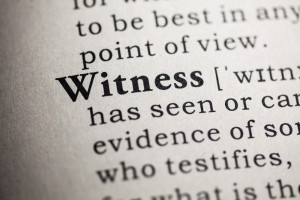 If you have ever watched a crime television show or movie, you probably have watched events unfold and an eyewitness re-telling what he or she saw to an officer. On a scripted television show or movie, it’s easy for the details to be accurate. In real life, however, that’s not always the case. You may think you have a fantastic memory and could remember all sorts of things, but have you ever thought about how good your memory would be if someone asked you a question about something you saw during a high-intensity situation?
If you have ever watched a crime television show or movie, you probably have watched events unfold and an eyewitness re-telling what he or she saw to an officer. On a scripted television show or movie, it’s easy for the details to be accurate. In real life, however, that’s not always the case. You may think you have a fantastic memory and could remember all sorts of things, but have you ever thought about how good your memory would be if someone asked you a question about something you saw during a high-intensity situation?
In a recent TED Talk, there was an immense discussion about the inaccuracy of an eyewitness account. In the past, many criminal cases were tried on eyewitness accounts alone, which caused more than 185,000 wrongful convictions of innocent people. Explained in this particular conversation was the complex way of how our brain functions. It stores bits and pieces of what we observe, but not the entire experience. When asked to recall information, our brain tries to connect the bits and pieces with speculation or information later accumulated. The bits and pieces are incomplete as a story, and the brain tries to establish the chain of events with new information or assumptions that are not necessarily accurate, nor are legally acceptable for an eyewitness account.
The problem is that the brain does this without your awareness; you are recalling things that you believe occurred, but in reality your brain created the particular story by incorporating observations with different knowledge and irrelevant information that does not have anything to do with the account. An example of this would be in a 1991 murder case where all five eyewitnesses testified that they could see the accused very clearly, but in actuality the event in question took place at 7pm in January on moonless evening. With a substantial reconstruction of the scene, scientists came to the conclusion that the lighting was poor at best. It had been readily established that the witnesses weren’t lying; they were simply using their brains to recollect the memories of the account and the mind reconfigured the bits and pieces into a story without much accuracy.
On the flip side, there are also times when there are multiple eyewitnesses, all with a different account of what happened. Situations such as these make it necessary to look for other evidence, clues, and solidarity to help establish the facts. When there are multiple accounts that vary tremendously, it only serves to decrease the strength of your argument. Even if eyewitnesses all say the same thing, it is important to not rely on that alone. A person’s memory is a reconstruction that could include both accurate information as well as inaccurate details. Having additional evidence to support the testimony is necessary for a stronger case.
If you are charged with a criminal offense, contact me, David W. Polsky, right away. As an experienced criminal defense attorney, I will personally represent you and work to get the best possible outcome by assessing your personal situation in order to protect your legal rights. Call today for a free consultation at (973) 686-9787.

 (973) 686-9787
(973) 686-9787 Totowa, NJ 07512
Totowa, NJ 07512 Menu
Menu





